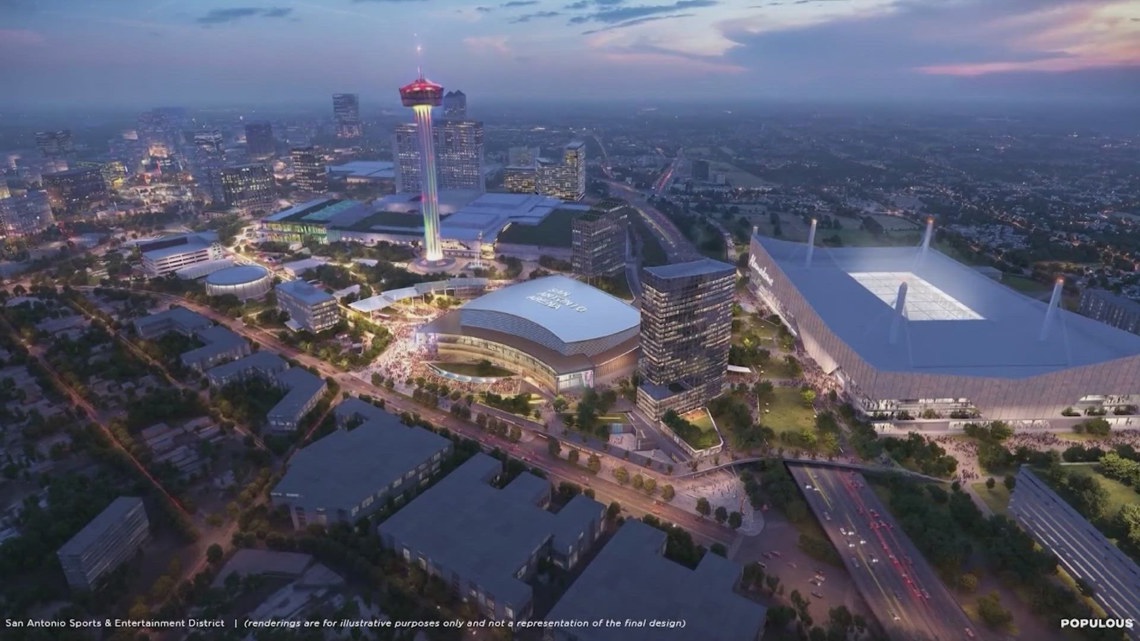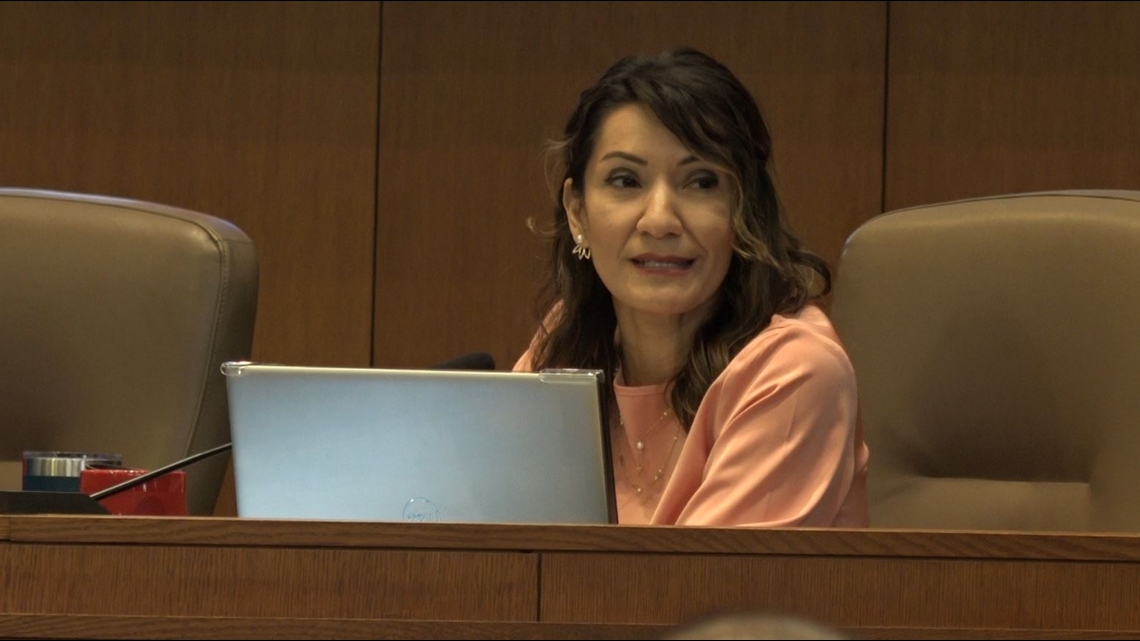The vote gives City Manager Erik Walsh the green light to get into the meat of negotiations with the Spurs and Bexar County over development.
SAN ANTONIO — When City Manager Erik Walsh reconvenes with the Spurs and Bexar County for meaningful discussions surrounding the team’s potential move downtown, he’ll now have two City Council representatives by his side.
San Antonio City Council on Thursday unanimously approved green lighting Walsh to continue working towards a memorandum of understanding, allowing all the parties to further refine a development framework for a new Spurs arena, renovating the east side’s Frost Bank Center and Freeman Coliseum grounds, and the city’s overall Project Marvel dreams—contingent on all sides coming into an agreement.
But City Council members Sukh Kaur and Jalen McKee-Rodriguez – who represent the downtown and east-side areas, respectively – will now also have a seat at the table.
That’s thanks to a push led by Councilwoman Melissa Cabello Havrda to amend the ordinance to ensure her two council colleagues participate in “substantive discussions” about the arena, a tweak sparked by concerns that there hasn’t been adequate transparency in the negotiating process up to this point.
“I’m kinda tired of talking about transformation,” said Cabello Havrda, evoking the buzz word that city staff and leaders have deployed to talk about the potential of a downtown sports and entertainment complex. “I don’t think our city wants transformation if we’re leaving people behind. I do want to know that we’re being transparent and we’re being accountable to our city. And I think that specifically that the east side should be involved in these discussions.”
The transparency concerns go back to Wednesday’s City Council briefing on Project Marvel priorities and negotiations up to this point. There, City Council members expressed frustration over not having more concrete details about Project Marvel, which is how the city has labeled its downtown district ambitions.


“I’ve heard that we’ve been at this for over a year, and I’ll tell you that it’s a little bit embarrassing that after a year of looking at this, this is where we are,” District 10 Councilman Marc Whyte said Wednesday.
McKee-Rodriguez, meanwhile, said he believes that the conversations as they stand now are leaving his constituents on the east side out to dry. Looming large over the negotiations is the reminder of unfulfilled promises local leaders made to the east side when the then-AT&T Center was built at the turn of the century for the Spurs.
“If this conversation is an indicator for how people feel, the city feels about the east side, right now it is not good,” McKee-Rodriguez told his council colleagues Wednesday, referring specifically to potential transference of ownership of the Willow Springs Golf Course, which sits adjacent to Frost Bank Center grounds.
The District 2 representative continued on Thursday, saying that if it comes down to the desires of the Spurs or those who live in east San Antonio, “yesterday was proof that the Spurs are going to win every time.”
Cabello Havrda’s motion to include McKee-Rodriguez and Kaur in future talks with the county and Spurs – a suggestion Walsh said he was “not terribly opposed” too – eventually passed 9-2. But not until before the conversation turned into a debate on the purpose of the ordinance, and a suggestion by District 3 Councilwoman Phyllis Viagran that some of her colleagues didn’t trust Walsh could negotiate on their behalf.
“If you have an issue with our city manager and you do not think our city manager can go in and negotiate this and you need a supervisor (from) District 2, then we have a problem,” Viagran said. “And that is something we should discuss as a council if you don’t have trust in the city manager to negotiate this.”
Cabello Havrda countered later when she said her amendment to include east-side representation was more about giving voice to “a community that has been silent for decades.” Others noted still that a summer deadline looms: Bexar County has until August to call a venue tax proposal for the November election, which could represent the keystone funding piece for a new arena expected to cost anywhere from $1.2 billion to $1.5 billion.


But the City Council ordinance nearly evolved once more when District 5 Councilwoman Teri Castillo motioned for a change that would only empower Walsh to negotiate an MOU on behalf of the city—not execute it, at least not after further council updates and approval, which would prolong the process.
“For my part, I think that strikes the whole purpose of the ordinance,” Mayor Ron Nirenberg said.
Castillo’s motion later failed when only she and McKee-Rodriguez supported it.
What happens next?
Walsh will now get into the meat of negotiations with the Spurs and Bexar County leaders (with Kaur and McKee-Rodriguez joining for at least some of those talks) as the three parties work to achieve a non-binding memorandum of understanding ahead of the August deadline.
Some of those conversations might also lay the groundwork for how the various projects making up Project Marvel will ultimately be funded. For example: The Convention Center expansion project, expected to cost between $700 million and $900 million, could be paid for through the existing 9% hotel occupancy tax and/or a “project finance zone,” which allows the city to collect the growth in state’s “hotel-associated revenue” over a 30-year period.
Another project to transform the vacant federal courthouse into a live event venue (expected price tag: $100 million to $150 million) would hypothetically be paid for using the 9% hotel rental tax and private funds. A Spurs arena could be funded through any combination of private funds, the hotel occupancy tax, a voter-approved venue tax, Spurs contributions or the creation of a Tax Increment Reinvestment Zone.
Walsh has a list of things to consider in those forthcoming talks—items he says he took away from the initial City Council briefing on Wednesday. Chief among them is asserting that transferring ownership of Willow Springs is a “non-starter,” potentially laying the groundwork for a difficult conversation between the city and county going forward.
He’ll also bring up City Council’s concerns over a potential loss of green spaces and a desire for continuous public engagement.
“The true test of whether we’ve done a good job will be measured in 20, 30, 40 years,” Pelaez said at Thursday’s meeting. “We will have failed San Antonio if we make the same mistake that people made 25 years ago, and not stick to a plan. And that plan, today, is to look out for the entire area.”
